Interview Tiananmen Square Massacre Witness author of 'Inconvenient Memories'
A Personal Account of the
Tiananmen Square Massacre and the China That Caused It
30th Anniversary Was on June 4th
A powerful, honest and unique perspective of the cry for human rights,
a fair economy, and freedom.
Irvine, CA-- Immigrant and survivor Anna Wang offers a unique glimpse into the Tiananmen Square incident and the China surrounding it in her powerful new book Inconvenient Memories: A Personal Account of the Tiananmen Square Incident and the China Before and After. From her childhood account of living in an oppressed government system, to the activities during her college-age years that led to the protests in the Square and beyond, Wang’s revealing personal account is both gripping and terrifying. It’s a story that will never be allowed to be told in her home country.
“When the protests started, I was sent to the square on a daily basis to take photos for my Japanese boss to analyze for evidence of turning tides in the economy,” says Wang, who worked for Canon. “That’s why after almost thirty years I can still recall the details graphically.”
“A deeply intimate and revealing portrait of ‘real life’ inside China before and after the climactic Tiananmen Square Incident. Writer Anna Wang confronts her own country's history with eyes wide open. Breathtaking!"
John J. Kelly
Detroit Free Press
Having experienced students’ protests while studying at Peking University, Wang naturally felt for the cause of the students. Meanwhile, as an employee of a foreign enterprise, she observed the protests with mixed feelings.
“I felt sympathy for the students’ fight for democracy and freedom, but when I crossed the Tiananmen Square, hearing them sing “The Internationale will be the human race,” I became wary of them. What if the students succeeded and they took everything I owned and would own in the future? As the very few who worked for foreign enterprises at the time, I cared about the market economy, private property, and anything like that.”
Then the massacre occurred and Wang lived through the terrifying time when tanks were in the streets and people were dying. Every relationship around her was challenged.
“Not only is this book extraordinarily entertaining and well written, it is likely to become a significant source of China’s history and development as personally witnessed by an insightful participant. Highly Recommended on many levels.”
Grady Harp
Amazon Top 50 Hall of Fame Reviewer
After the massacre, while Wang’s best friend fled to the West, she decided to stay in China, believing her Japanese boss’ prediction that economic development would eventually bring democracy to China. Marching into the twenty-first century, as China joined the tide of globalization, Wang became a member of the middle class as she wished for in the 1980s, but she was disappointed to see that democracy didn’t come to China despite its thriving economy. “After the Tiananmen Massacre, no one had the guts to protest anymore. Pressure groups will never emerge,” she says. Wang moved to New Zealand to have a second child, then to Canada and America.
“The events of the June Fourth massacre in Beijing in 1989 were so extreme that descriptions of it tend to be emotional. Anna Wang’s story of her decision to stay in China, hoping that economic development would bring democracy (while many of her friends were emigrating) helps us to understand what an ordinary Chinese citizen’s life felt beneath all the sturm und drang of the times. The color of her descriptions brings to life a period of Chinese history that large forces seem to have pressed colorless.”
Perry Link
University of California, Riverside
Wang writes with a personal voice, bringing you into the crowded apartment that houses her and her grandmother, a fearful woman. As a child her grandma had her feet freed halfway through China’s brutal tradition of foot binding and as a result was partially crippled. Wang’s grandmother was also a terse woman who summed up her entire life with only one sentence. Quite the opposite, Wang, a writer at heart, yearned for her voice to be heard and swore in her childhood that “I shall become hundreds and thousands of words.”
“A remarkable and intense memoir! Wang also raises the question: ‘Does citizenship in counties such as Canada and the USA further immigrants feeling of belonging to the host nation or will there always be a deep yearning for their motherland?’”
Norm Goldman
Publisher & Editor
Wang’s story of the massacre stands out from others because of her station in life, and her freedom to write what she knows from a democratic country. “Living in China as an emerging middle class during the protests gives me a unique perspective,” she says. “One I haven’t seen in previous accounts. The Tiananmen Massacre wasn't quite as simple as good vs. evil, democracy vs. dictatorship. It wasn’t just about the people standing up to an inhumane regime. The lines that divided the two sides were blurrier than most could or would have even known.”
As an immigrant, Wang wants to use her book to establish that “Chinese people are not the same entity as China’s fascist regime. We need to fight for China to become a country that accepts universal human values. Telling my truth of what happened thirty years ago is part of this effort.”
Inconvenient Memories is a powerful and deeply personal story of human rights, the cry for freedom, and the mix of guilt and joy that comes from immigration. This book accounts the infamous Tiananmen Square Incident from an unprecedented perspective.
About Anna Wang: Born and raised in Beijing, China, Anna Wang received her BA from Peking University and is a full-time writer. She has published nine books in Chinese. These include two short story collections, one essay collection, four novels and two translations. An English translation of her short stories, Beijing Women: Stories, was published in 2014. Inconvenient Memories is her debut book written in English. Visit her website at http://www.AnnaWangOnline.com
Inconvenient Memories: A Personal Account of the Tiananmen Square Incident and the China Before and After, 2019, Purple Pegasus Publishing, ISBN# 978-0-9966405-7-2, hardcover, 390 pages, US$29.95, CAD36.50, ebook $9.99, available on Amazon.
View the book trailer here: http://bit.ly/TrailerInconvenientMemories
Media Contact: For a review copy of Inconvenient Memories: A Personal Account of the Tiananmen Square Incident and the China Before and After or to arrange an interview with Anna Wang, contact Scott Lorenz of Westwind Communications Book Marketing at scottlorenz@westwindcos.com or by phone at 734-667-2090.
Follow Lorenz on twitter @abookpublicist
-END-
Anna Wang, author of Inconvenient Memories: A Personal Account of the Tiananmen Square Incident and the China Before and After
Anna Wang was born in China in 1966, the year the Cultural Revolution began. While still an infant, her parents’ jobs required them to leave her to grow up with her grandmother, a woman whose feet had been crippled in the brutal Chinese tradition of foot binding.
Growing up in the 1970s, Wang tried to make sense the relationship of herself and her country with the world. Nixon’s visit to China cast doubt on her belief that communism was the best social order. In the 1980s, she was forced to choose sciences as her major by her parents who still had the shadow of the Cultural Revolution in mind, fearing that writing the wrong thing would bring disaster. During her college years she made the bold decision to change her major to Chinese Literature against her parents’ wishes. But it wasn’t until later in her adult years that she took pen to paper and started publishing her work.
As a young woman, Wang left college to pursue a job with the international camera company, Canon. When the student protests started in Tiananmen Square, her Japanese boss sent her there every day to take photographs and document what was happening—something forbidden by the Chinese government. Contrary to the common belief that the students’ protests would bring democracy to China, Wang’s Japanese boss, a keen observer, feared that Canon’s project in China would be hindered once the status quo was broken. This attitude deeply influenced Wang’s perspective while she witnessed the protests unfolding.
After the crackdown, while many college graduates fled to the West, Wang decided to stay in China, believing her Japanese boss’ conviction that economic development would eventually bring democracy to China. As time marched into the twenty-first century, Wang was disappointed to see that democracy didn’t come to China despite its thriving economy. She finally joined the tide of emigration. She moved to New Zealand first, then Canada and the United States. While living in Canada, she worked at Mingpao Vancouver branch from 2007 to 2009 and studied at Vancouver Film School from 2009 to 2010. As a member of the emerging middle class of that time in China, she has a unique perspective to offer in her new book Inconvenient Memories: A Personal Account of the Tiananmen Square Incident and the China Before and After.
Wang is the author of nine books in Chinese, including the Chinese translation of Alice Munro’s The View from Castle Rock. The collection of Wang’s stories about Chinese women’s survival in the breakneck market economy of China in the 1990s, Beijing Women: Stories, was translated into English and published in 2014. Inconvenient Memories, a work of autobiographical fiction, is her debut English book.
She lives in Irvine, CA with her husband and two children. She is currently at work on her next novel, a historical fiction story set in China. Read more at www.AnnaWangOnline.com.
Excerpts from Inconvenient Memories: A Personal Account of the
Tiananmen Square Incident and the
China Before and After
“You need to learn to be grateful,” my grandma sad. “I am thrilled that we could stay in our home.” She meant that we had passed the security check and were not sent to a remote camp.
I shall become hundreds and thousands of words.
In a Chinese person’s adult life, one had only a few precious chances to climb the social ladder.
The entire country is one chess board, and we are all pawns of the socialist order.
He once reported to my parents that I secretly read novels, which was strictly forbidden in our family.
As college graduates, my pa
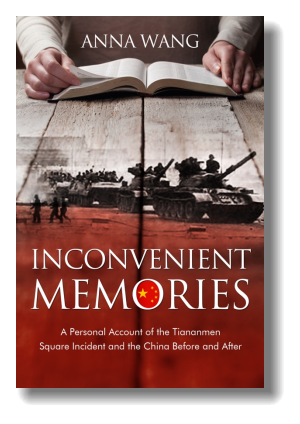
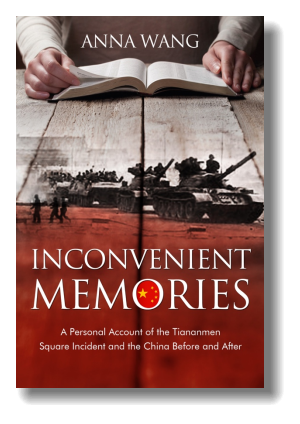
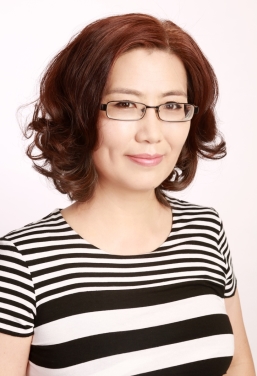
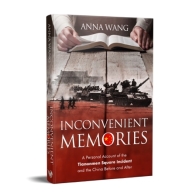

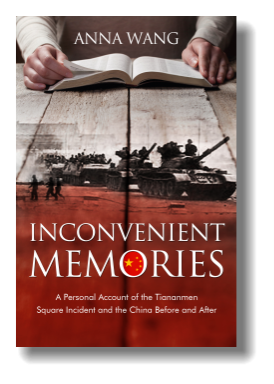
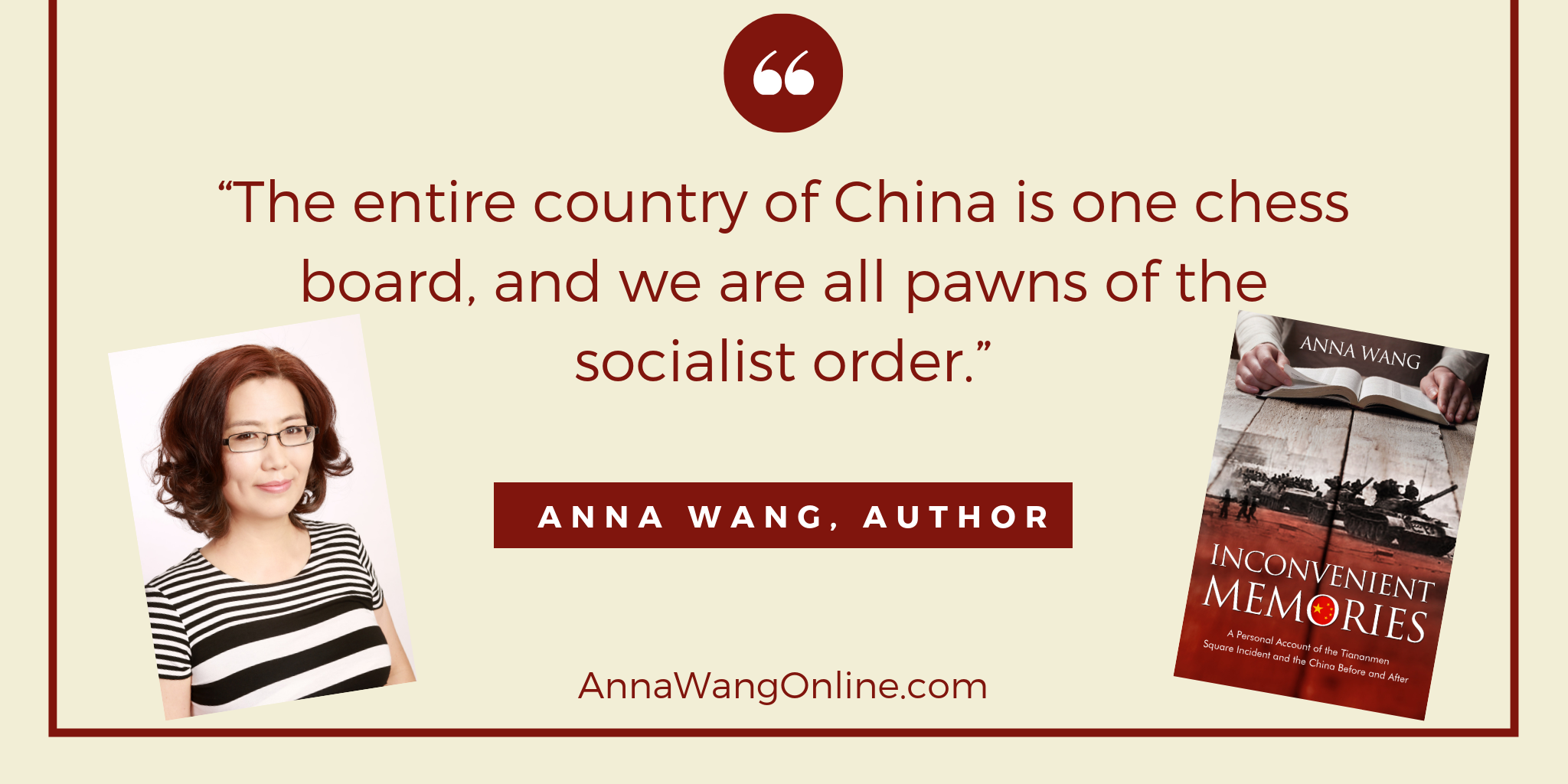
About Us
Anna Wang, author of Inconvenient Memories: A Personal Account of the Tiananmen Square Incident and the China Before and After
Anna Wang was born in China in 1966, the year the Cultural Revolution began. While still an infant, her parents’ jobs required them to leave her to grow up with her grandmother, a woman whose feet had been crippled in the brutal Chinese tradition of foot binding.
Growing up in the 1970s, Wang tried to make sense the relationship of herself and her country with the world. Nixon’s visit to China cast doubt on her belief that communism was the best social order. In the 1980s, she was forced to choose sciences as her major by her parents who still had the shadow of the Cultural Revolution in mind, fearing that writing the wrong thing would bring disaster. During her college years she made the bold decision to change her major to Chinese Literature against her parents’ wishes. But it wasn’t until later in her adult years that she took pen to paper and started publishing her work.
As a young woman, Wang left college to pursue a job with the international camera company, Canon. When the student protests started in Tiananmen Square, her Japanese boss sent her there every day to take photographs and document what was happening—something forbidden by the Chinese government. Contrary to the common belief that the students’ protests would bring democracy to China, Wang’s Japanese boss, a keen observer, feared that Canon’s project in China would be hindered once the status quo was broken. This attitude deeply influenced Wang’s perspective while she witnessed the protests unfolding.
After the crackdown, while many college graduates fled to the West, Wang decided to stay in China, believing her Japanese boss’ conviction that economic development would eventually bring democracy to China. As time marched into the twenty-first century, Wang was disappointed to see that democracy didn’t come to China despite its thriving economy. She finally joined the tide of emigration. She moved to New Zealand first, then Canada and the United States. While living in Canada, she worked at Mingpao Vancouver branch from 2007 to 2009 and studied at Vancouver Film School from 2009 to 2010. As a member of the emerging middle class of that time in China, she has a unique perspective to offer in her new book Inconvenient Memories: A Personal Account of the Tiananmen Square Incident and the China Before and After.
Wang is the author of nine books in Chinese, including the Chinese translation of Alice Munro’s The View from Castle Rock. The collection of Wang’s stories about Chinese women’s survival in the breakneck market economy of China in the 1990s, Beijing Women: Stories, was translated into English and published in 2014. Inconvenient Memories, a work of autobiographical fiction, is her debut English book.
She lives in Irvine, CA with her husband and two children. She is currently at work on her next novel, a historical fiction story set in China. Read more at www.AnnaWangOnline.com.
Contacts